The Lenovo ThinkPad X1 Carbon Review (2015)
by Brett Howse on May 21, 2015 8:00 AM EST- Posted in
- Laptops
- Lenovo
- ThinkPad
- Ultrabook
- Broadwell-U
Battery Life
With the introduction of Broadwell-U earlier this year, we have seen yet another step up in battery life on notebooks. It does not all come down to the CPU though, although having one that draws plenty of power while doing nothing is certainly not beneficial. Display technology is also a big factor, and we have seen quite strongly that the higher resolution panels can certainly struggle for battery life compared to more average resolution displays. If a device is to have truly great battery life, every single component needs to be sorted out, because any single one drawing extra power can have a significant effect on the overall battery life. The other factor of course is battery size, and the X1 Carbon has a 50 Wh battery.
To test battery life on notebooks, we have two tests. Our light workload consists of browsing four pages every minute with the display set to 200 nits. The heavy test gets a lot of the other components into the mix. The web browsing is increased to about twenty pages per minute, a video is played, and a 1 MB/s download is done to keep the wireless active.
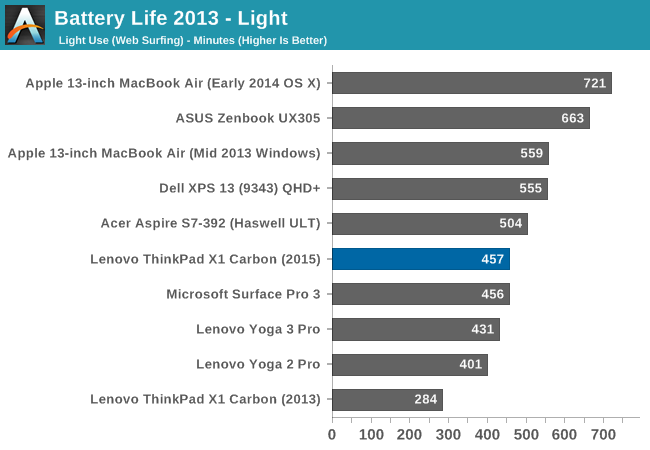
On our light test, the X1 Carbon is well off of the leaders in this test. It does seem odd to say that almost eight hours of battery life is not enough, but the bar has been raised this year. The X1 Carbon does have a slightly smaller battery, but as we will see in a bit that is not the reason for the lower than average result. A lot of this can likely come down to the display. In order to hit 200 nits, the display had to be set at 92% brightness which is quite a bit higher than most devices. Since this test is generally affected more by display power draw than any other, I would tend to think that this display is not the most efficient out there. It is always a bit of a guess though, since we cannot directly measure the power of each component.
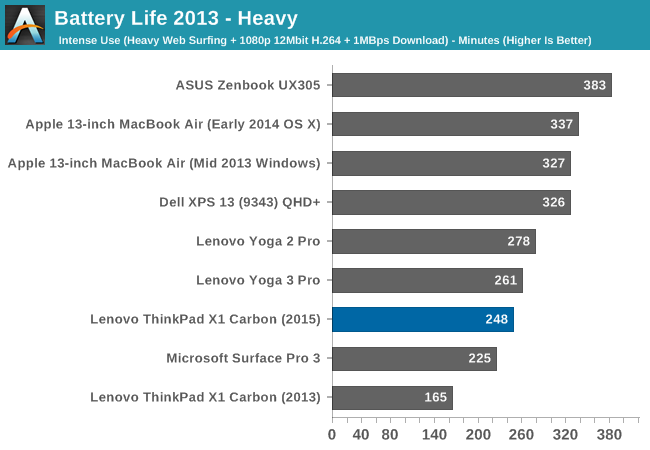
In the heavy test, the X1 Carbon falls even farther as the more efficient devices move past it. One thing to highlight from this test is the 2013 X1 Carbon. That was just two years ago, and battery life has skyrocketed since then.
Next we have our normalized graphs which show the amount of battery life divided by the size of the battery in order to judge how efficient each device is.
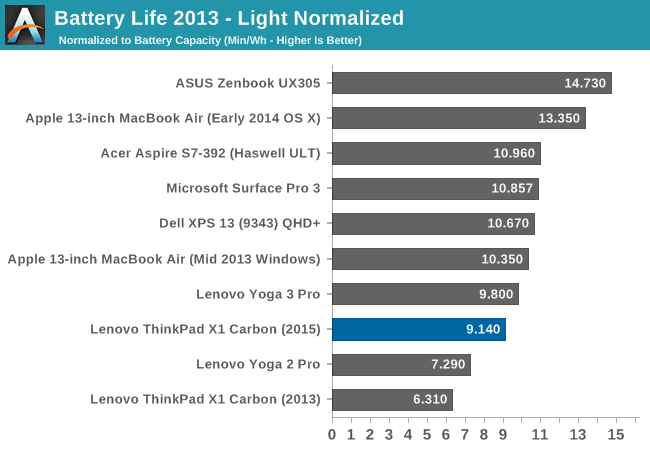
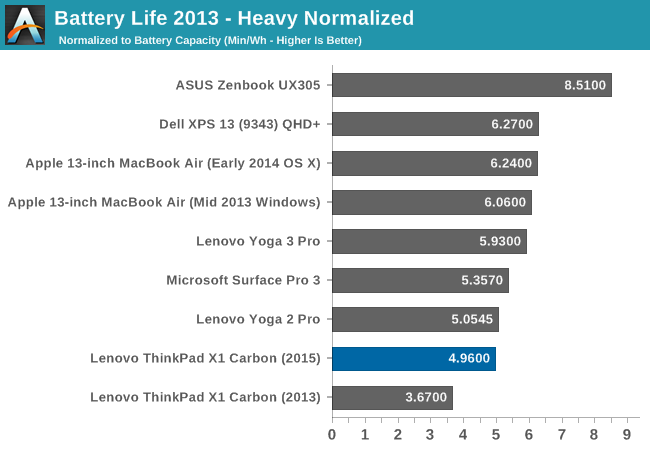
The light result shows that the X1 Carbon is not that much less efficient than some of the competition, but it also has one of the smallest batteries at 50 Wh despite this being a 14-inch notebook. Dell squeezed a 52 Wh battery into the XPS 13 this year despite the much smaller dimensions facilitated by the small display bezels. The heavy graph has an even worse result. Battery life is not the forte of the X1 Carbon. Even though it is not the battery life winner, taking a look at the Ivy Bridge powered X1 Carbon for 2013’s score really underlines the big gains seen in efficiency. Just two years ago, the X1 Carbon was about mid-pack in efficiency (see our review here) and just two years later the new X1 Carbon is almost 45% more efficient than the 2013 model, and yet it is almost at the bottom of our Ultrabook chart for battery life.
Charge Time
The X1 Carbon sports Lenovo’s Rapid Charge technology which will let you charge 80% of the battery capacity in just 30 minutes. Lenovo says that they use high current rather than high voltage to increase the battery charge rate, which they claim helps battery longevity. Whichever it is, the X1 Carbon does offer some pretty fast charging.
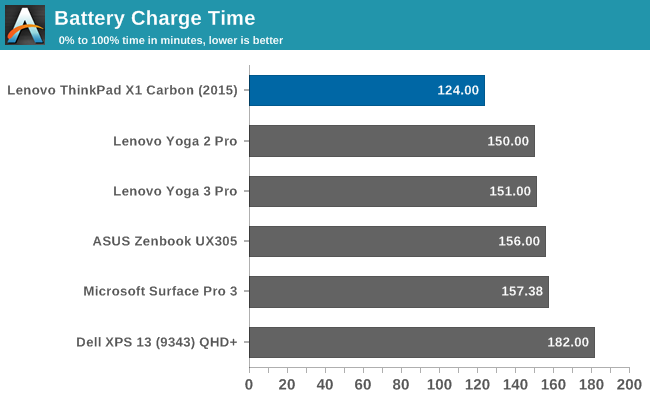
With the included 45 watt adapter, I was unable to reach the 80% in 30 minutes, but with the higher output adapters it could happen. Even with just the 45 watt model 80% happened in just 69 minutes which is very impressive, and a full charge took just over two hours. The battery life may not be at the top of the charts, but luckily if you do drain the battery you can get it back to a reasonable level in not too long.


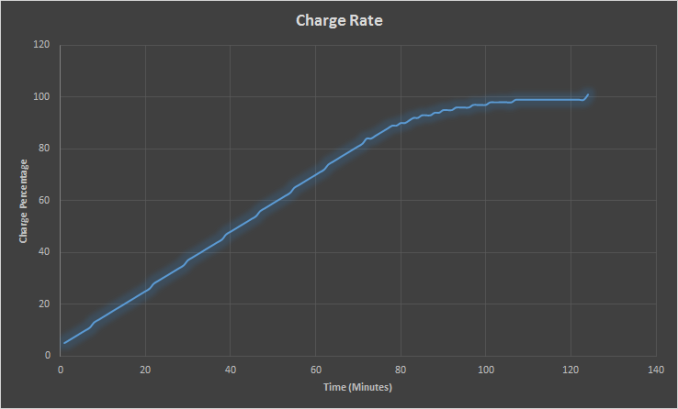








103 Comments
View All Comments
digiguy - Thursday, May 21, 2015 - link
These are ULV CPUs, they will never close the cap with desktops CPUs, even from a couple of generations ago (provided we are speaking of the same line, that is i7). My 3rd gen quad core laptop CPU is much more powerful than this and even my 2nd gen dual core i7 ultrabook is almost on par with this thanks to a higher (35W) TDP. Having said that a comparison with quad core mobile CPUs would be interesting to see the difference with the best ULVs.nerd1 - Friday, May 22, 2015 - link
If you don't utilize more than 3 cores (few application does) they are actually comparable.Valantar - Thursday, May 21, 2015 - link
Great review! It's good to see how this ultra high end ultrabook is evolving alongside others, even if it still has some of the same issues as before.Now, could you, beg, borrow or steal a similarly specced X250 from Lenovo for comparison? It's an interesting parallell between the two, with the X1 Carbon having a larger screen, m.2 storage and slimmer build, while the X250 is more upgradeable (SODIMM RAM! up to 16GB!), has an intriguing battery solution (both an internal 23.2WHr and a replaceable 23.2-72WHr one, for a total 46-95WHr(!) capacity) and is of course slightly cheaper. I'd love to see an Anandtech review of the follow-up to my beloved X201.
vision33r - Thursday, May 21, 2015 - link
Imo, Lenovo killed Thinkpads today because of shoddy quality and poor software. To allow even malware to their factory software and driver builds tells you they are not thinking about quality.Dells and HP corporate level hardware is better today than Lenovo. Because the BIOS and software provided by HP and Dell are simpler and more stable. There are too many issues with Lenovo firmware and BIOS today. Out of 150 that we received, probably 7-8 will have stability problem using a Windows 8.1 Gold image that we deploy tells you something.
Hulk - Thursday, May 21, 2015 - link
I bought a Lenovo t450s a few months ago and have been very happy with it.And yes it was loaded with tons of crap. I just wiped it and started over. Now it's nice and clean.
BMNify - Thursday, May 21, 2015 - link
Lenovo thinkpad desktop and laptops and other enterprise machines were never loaded with adware, it was a consumer line problem which was rectified. The fact that you have to resort to blatant 100% lies completely invalidates your rant against Lenovo.chizow - Thursday, May 21, 2015 - link
We've had a few X1 Carbons come through, and while it is a solid piece of hardware, just be ready for UEFI and various other issues due to the lack of built-in network adapter if you are using/deploying it in an enterprise environment. Had to work through a few issues with our PXE server and UEFI boot as well, but nothing too bad.Overall Lenovo have been solid for us, lots of X230/X240 in our environment, the only major complaint I have is the amount of overlay/proprietary bloat Lenovo has to use basic functions like WiFi, BT, projectors.
Personally, I vastly prefer Dell Latitude series, especially the latest E7250 and E7250. Amazing keyboards, I've always preferred Dell's keyboards even compared to MacBook chiclets, but now you get the same Dell feel with full chiclet keys.
GeorgeH - Thursday, May 21, 2015 - link
? All X1s have both wired and wireless network adapters.wintermute000 - Thursday, May 21, 2015 - link
I hate it how my T440 has a bloody ultrabook CPU (and still hasn't got anywhere near macbook type battery life). VMs grind it to a halt.I would trade a bit of weight for more battery / a real CPU any time, the company offered an X1 or a T440 and I picked the latter thinking I'd get a real CPU but nope, same ultrabook form over function rubbish
mdvision - Thursday, May 21, 2015 - link
I am both an HP and Lenovo authorized business partner. I have to agree with some other posters that the HP Elitebook line has been superior in build, design and warranty response. My personal device of choice for the last couple of years has been the HP Folio 9480m ultrabook. Battery time is decent....not spectacular but more importantly is user replaceable and there is an optional secondary slice battery option that while adding a bit of thickness and weight provides REAL all day run time. RAM is conventional SODIMM's and serviceable / upgradable as well.My current model has an I7 4600U ULV CPU, 8GB RAM, 256GB SSD, 1600x1200 matte display. The display resolution is fine on a 14" display and scales well using Win8.1 Pro. Performance does not lack (gaming excepted of course). I change my demo unit out every quarter or so and keep replacing with the same unit. This is a great device. Warranty response on HP Elitebook products have been nothing but exemplary on the very few units I've had to do warranty claims. RMA turn around times are very fast as in days not weeks. Technical support personnel have been knowledgeable and professional.
Field serviceable batteries, RAM, HD's are important enough that any minimal weight savings are more than offset rather than having the thinnest / lightest device that requires factory servicing for routine maintenance / repair.
I also have these deployed with the optional docking station which have performed flawlessly using external displays, peripherals and charging. Smart Buy configurations are competitively priced and offer good value. Highly recommended.
I've previously considered the X1 Carbon but the above design features always sway me back to the HP.